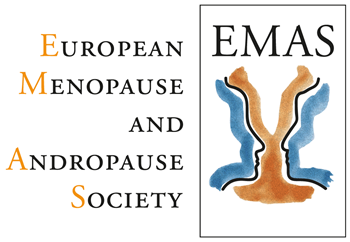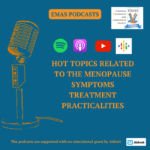Host: Welcome to today’s podcast. Menopausal Hormone Therapy Safety Data 20 years after the Women’s Health Initiative, a breast cancer risk perspective. This episode is part of a podcast series supported by Abbott. The content is solely the responsibility of EMAS, the European Menopause, and Andropause Society. All our episodes are available in English, Spanish, Mandarin, and Russian. And you can find them on any of the most popular podcast platforms.
In today’s episode, Dr. Antonina Smetnik head of the Department of Gynecological Endocrinology of the National Medical Research Center for Obstetrics Gynecology and Perinatology, Moscow, Russia, will help us understand the effect of different types of menopausal hormone therapy on breast cancer risk, from the Women’s Health Initiative study to the most recent data.
Dr. Antonina Smetnik: Breasts are the target organs for numerous hormones and growth factors. And, in the early 2000s, there was a huge decrease in the number of menopausal hormone therapy users because of the first results of the WHI study, which showed that combined menopausal hormone therapy increases the risk of breast cancer. The relative risk of breast cancer in users of conjugated equine estrogens and medroxyprogesterone acetate was 1.26. It is less than one additional case for 1,000 women using MHT per year. However, there was a decreased risk of breast cancer in estrogen monotherapy users after hysterectomy. And there were no elevated risks in MHT prior non-users.
According to the French E3N cohort study and registry study from Finland, estrogen and progesterone, or estrogen and dydrogesterone were not associated with a significantly increased risk of breast cancer. According to the nested case-control studies with more than 98,000 cases and 457,000 of controls, there was no increased risk from short-term use of up to 5 years of estrogen-only or estradiol dydrogesterone and tibolone. Most women took combined HRT, which was linked to a small increase in the risk of breast cancer. The risk increased with a woman’s age, with lower increases in risk for women in their 50s compared with those in their 60s and 70s.
The duration of treatment with lower increases in risk with HRT taken short-term less than 5 years, then long-term more than 5 years. Current or more recent HRT treatment came with higher risks than past use more than 5 years ago. The type of progestogen in combined HRT with the highest risks was seen with norprogesterone and the lowest was dydrogesterone. The researchers stressed that some women who had never taken HRT would still get breast cancer. For example, if a group of 10,000 women in their 50s had never taken HRT, 26 women would still get breast cancer in a year.
HRT is linked to 9 extra cases of breast cancer in a year, that is less than 1 in 1,000 women. The increased risk was mostly linked to combined HRT, and the type of progestogen made a difference. For women in their 50s, no extra risk of breast cancer was seen with combined HRT that was stopped more than five years previously.
The extra risk among women in their 60s and 70s was minimal. There was no increased risk of breast cancer with any current HRT taken for one year or less, with past use of estrogen on the HRT even if taken long term, with past use of combined HRT, taken short term.
Different types of combined HRT had different risks. The lowest was with dydrogesterone which is not prescribed as often as progestogens with higher risks: norethisterone, medroxyprogesterone, and levonorgestrel. It is important that general practitioners discuss the benefits of the risk of HRT with women troubled by symptoms of menopause. HRT can have a dramatic effect on these symptoms and this research suggests that the risks of breast cancer are low. The results could guide the choice of HRT and the length of time women take it. Thank you for your attention.
Host: Today, Dr. Antonina Smetnik discussed the effect of different types of menopausal hormone therapy on breast cancer risk from the Women’s Health Initiative study to the most recent data. Thank you for listening to today’s episode. We hope it will be valuable for your clinical and research practice. Stay safe.
[END]


